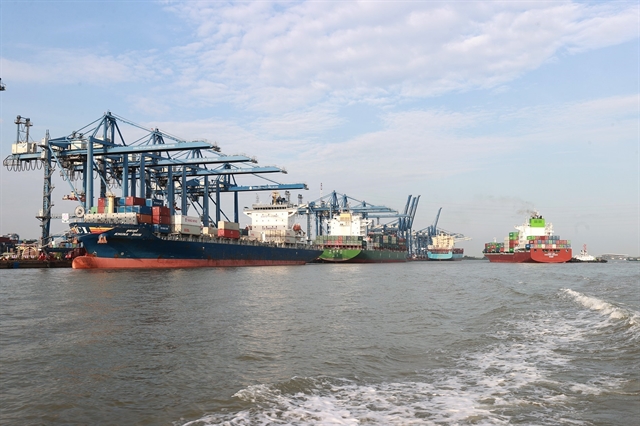 Society
Society

 |
| Container ships loading and unloading goods at Tân Cảng - Cát Lái Port in HCM City's Thủ Đức city. — VNA/VNS Photo Dương Giang |
HCM CITY — HCM City has eliminated port infrastructure fees for imported and exported goods transported in and out of the city through the Việt Nam-Cambodia waterway route, in accordance with a waterway transportation agreement signed between the two countries.
The Việt Nam Inland Waterway Administration (VIWA) on Monday (October 23) held a conference to disseminate and propagate the waterway transportation agreement on waterway transport and update relevant regulations and content in new legal documents.
The Việt Nam-Cambodia waterway opened under the waterway transportation agreement signed between the two countries in 2009 and came into effect in 2011. An Annex amending the Agreement began in 2019 to facilitate maritime trade between the two countries.
The route running through two border gates, Thường Phước - Kok Rohka and Vĩnh Xương – Caom Samnor, not only eases goods transport in the Cửu Long (Mekong) Delta region but also plays an important role in connecting and consolidating goods at the seaports in the southern region such as Sài Gòn Port and Thị Vải - Cái Mép deep-water port cluster.
The agreement has facilitated the passage of more than 2.5 million TEUs of cargo containers on the Vietnam-Cambodia waterway routes.
The volume of containers on the routes reached nearly 417,700 TEUS last year, a year-on-year increase of 19.7 per cent.
In the first quarter of 2023, the volume of containers on the routes only reached about 77,340 TEUs, a decrease of 25 per cent compared to the same period last year.
Port infrastructure fees for international goods transported by inland waterways in and out of HCM City were cut by half on August 1, 2022.
Accordingly, a 50 per cent cut in fees was applied to goods for temporary import and re-export.
Authorities collect the same rates for imported and exported goods declared outside the city as those declared in the city.
Besides these measures, imported and exported goods for national defense and security, responding to and overcoming consequences of natural disasters and epidemics, and some other purposes are exempt from fees.
According to VIWA, agencies will work day and night following the provisions of the agreement. However, the working hours at the border gates are only six hours per day, which creates unfavorable conditions for optimising waterway transport development.
Therefore, VIWA has asked authorities of the border provinces of An Giang and Đồng Tháp to work with Kaom Sarno and Koh Roka provinces during overtime working hours at the border gates.
The key waterway for transporting goods by ship between HCM City and the Mekong Delta region has to go through Chợ Gạo Canal in Tiền Giang Province, but the canal is still not wide enough for the increasing number of boats.
The province is spending over VNĐ1.3 trillion (US$52.7 million) on a project to upgrade the canal, one of the Mekong Delta’s most important waterways.
Some 1,100 vessels travel along the canal every day.
The canal also suffers from traffic congestion during peak hours, which can affect the quality of transported produce. — VNS